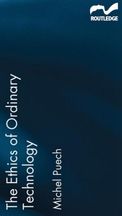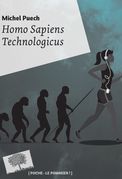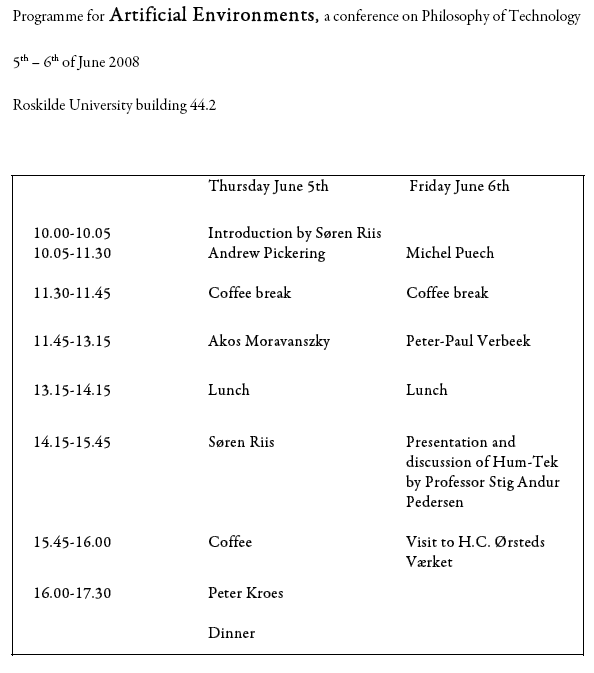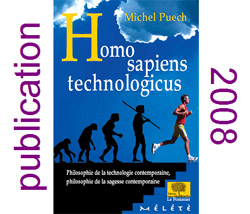Accueil
MP site personnel
Documents
universitaires
Médias
Grand Public
et Jeunesse
Book
The ethics of ordinary technology
Livre
Homo Sapiens
Technologicus
Livre
Développement
Durable
Bibliographies
commentées
Papers in
English 
Interventions
FORUM


INTERVENTION Colloque | June 5-6th, 2008: Copenhagen (Roskilde University, Denmark), Artificial Environments
"What is and what is not a problem with the Homo Sapiens Technologicus"
Michel Puech (Paris-Sorbonne) 
Online
["What is and what is not a problem with the Homo Sapiens Technologicus", Michel Puech - Presentation slides - in pdf].Conference Issues
Artificial EnvironmentsHow do different artificial environments influence their inhabitants? From which point of view can we asses these environments epistemic and anthropological implications? Is it possible to understand new technological spheres within a traditional ontological framework? Does the pervasive use of technologies in present-day societies demand a post-humanistic moral? The answers to these questions will all have bearing on future philosophical inquiries and concepts as well as the groundwork of a neo-materialistic world order.
To facilitate a discussion of these questions and the related answers, we have invited a group of very different contemporary thinkers, ranging from modern philosophers, to sociologist and architects. Nevertheless, a common trait of this group of scholars is their preoccupation with STS. In the context of the conference, we will strive to bring the invited scholars to lay bare and openly discuss the radical consequences of their present work.
In other words, participants in the conference are invited to join an intense two day intellectual endeavour to better understand the dimensions, codes and potentials of the various environments, technology makes possible. You will hear about the dual nature of artefacts, new interpretation of homo sapiens, synaesthetic effects of architecture but also receive a better understanding of how cybernetics has struggled to make the forces of nature more social.
Programme

Presentation Abstracts
All abstracts according to the alphabetical order of the speakers:
The Ontology and Morality of Technical Artifacts
Peter Kroes
Delft University of Technology
The artificial environment in which we are living consists to a large degree of technical artifacts. My intention is to explore the ontological and moral status of technical artifacts. I will argue that they have a dual nature; they are constituted on the one hand by physical objects, on the other hand by human intentions. As such they do not fit into the ontology of the physical world, nor in the ontology of the social world. Starting from this ontological view on technical artifacts I will argue that they have an inherent moral significance. I will illustrate my analysis with the example of Drancy, a public housing project in France, near Paris, that was turned into a concentration/transition camp for Jews during the Second World War.
Sounding Bodies
The Notion of Atmosphere in Recent Swiss Architecture
Ákos Moravánszky
Eidgenössische Techniche Hochschule (ETH), Zürich
The interpretation of Neo-Rationalist tendencies in Swiss architecture in the 1970s-1980s was based on a semiological reading of architectural forms. Concepts such as the “autonomy of architecture” or “inner-architectural reality”, formulated by architectural theorists Stanislaus von Moos and Martin Steinmann, emphasized that meaning in architecture is produced by the constellation of a building with its historical precedents. Architecture was explained as a signifier, which corresponds with a signified in the socio-cultural sphere, and signifies as well by associating and dissociating itself from other artefacts of the past.
This theoretical approach was generally accepted to analyze the architecture of the Ticino school or Aldo Rossi, who joined the faculty of the ETH Zurich between 1972 and 1974, and made a lasting impact on the young generation. However, some of Rossi’s students, like Jacques Herzog and Pierre de Meuron, started to criticize the “directly narrative” character of Rossi’s architecture, and argued for a phenomenological approach, which relies on the perceptual participation of the observer. Influenced by environmental artists and using the results of experiments with materials, Herzog and de Meuron or Valerio Olgiati exploit today rational design methodology, setting up logical rules and executing the results with the utmost precision – but the environments which they have realized are to be grasped by intuition rather than by reason. Finally, the recent interest in creating atmospheres by cross-sensory, synaesthetic effects in the work of Peter Zumthor corresponds with recent attempts to apply concepts of the aesthetics of nature (the sublime) to everyday life. The notion of atmosphere implies the rejection of reducing space to its optical aspects, and the increased attention for a sphere between the realms of objectivity and subjectivity.
MATTER, THEORY, CYBERNETICS, POLITICS
Andrew Pickering
University of Exeter
I begin with a brief history of the discovery of matter and material agency in science studies, and then take a reflexive turn, asking how theory in STS might feed back into real world practices and objects. In particular, I will talk about my analysis of the ‘mangle of practice,’ and about how one can understand cybernetics as ontological theatre—as staging a mangle-ish ontology in a variety of fields. Drawing upon examples drawn from architecture, the arts and psychiatry, I want to show that cybernetic projects differ from their more familiar relatives along an axis that one could label revealing/enframing in Heideggerian terms, and that there is thus something inherently political at stake in this discussion. Along the way I touch on differences between my perspective and that of Latour and the actor-network approach.
What is and what is not a problem with the Homo Sapiens Technologicus
Michel PUECH
The Paris-Sorbonne University
Is Homo Sapiens having a problem because he has to become Technologicus, and this because of the artificial environments he has to live in? I do not think so. I suggest that Homo has always been Technologicus, a technical species. We cannot live but in an environment which is natural and artificial, a world in which we find homes, tools, sitting around a fire, wearing clothes, and using a very sophisticated technique: language. This is not an “artificial” environment, even if artefacts are so important in it, and this is not exactly a “natural” environment, even if everything in it comes more or less directly from nature. This is the human environment. Being human means: building and inhabiting such an environment.
What is at stake then? Homo Technologicus is having a problem because he has to become, at least, Sapiens, and this because of the power of his present technologies. We are an arrogant species and we were wrong to call us “sapiens” so early. We have to re-think what we are, and not in terms of “artificial” and “natural”. The philosophical heritage, western and eastern, may have a word to say on this new wisdom.
Penthouse Living:
Towards a Phenomenology of Skyscrapers
Søren Riis
University of Roskilde
The skyscraper and the fascinating skyline of New York City have become the icons of 20th century civilisation. Due to the 9/11 attack on Twin Towers, a number of scholars predicted the end of skyscrapers in the 21th century. But recent history has proven them wrong. Throughout the world there have never been so many skyscrapers under construction as today.
So why do civilized people race for the sky? Which techniques does this endeavour demand? What is the difference between two and three dimensional cities, i.e. between horizontal and vertical constructions? Which consequences do these high rise penthouse environments have for the high society? And when does size really matter?
Since Aristophanes portrayal of Socrates, philosophers are often being accused of dwelling in the sky. For this reason, one should think that philosophy has a privileged access to skyscrapers and as a result be able to answer some of these questions. However, the accusation most often reads as a critique of philosopher’s lack of sensitivity towards materiality and their following disability to understand concrete technologies such as skyscrapers. In this talk I will strive to put the abstract tools of philosophy to work and test their capacity on these urban giants.
Moral Subjects and Smart Environments:
Toward an Ethics of the Mediated Self
Peter-Paul Verbeek
University of Twente
The concept of artificial environments, which is the focus of this workshop, suggests a contradiction with a ‘natural environment’, which would be a more original or desirable place for human beings to live. Many approaches in philosophical anthropology, however, have convincingly shown the ‘natural artificiality’ (Plessner) and ‘originary technicity’ (Stiegler) of human beings. Human beings do not inhibit a biotope, but a technotope; their world is not something given but something to be designed.
The new technology of Ambient Intelligence introduces a new stage in the development of the technotope. This technology consists in ‘smart environments’ than anticipate and interact with their users in intelligent ways, in many cases explicitly influencing human actions and decisions. Ambient Intelligence makes it possible to elaborate the ‘originary technicity’ of humanity to the realm of ethics. Even though ethics is most often taken to be an exclusively human activity, the profound influence of Ambient Intelligence on human actions and decisions shows that there are good reasons to approach it as an interaction between humans and technologies. This raises many problems in ethical theory. How to understand the moral subject resulting from this interaction? How to deal with issues of moral responsibility, for instance, or autonomy?
Critically applying the ethical perspective developed in the late work of Foucault, this paper will develop a non-humanist approach to the moral subject, which does not locate the moral subject outside the realm of technology, but rather sees it as a hybrid of human and nonhuman elements. Foucault’s ethics of moral self-constitution will make it possible to conceptualize the moral subject as the result of the ‘ascetic’ interactions it has with its technological environment. This ‘natural artificiality’ of morality helps to constitute the human condition in a technological culture.

Contact
Amalie Frese (afrese@ruc.dk), Secretary of PHIS, Section of Philosophy and Science Studies, Roskilde University, P6, 4000 Roskilde, DenmarkMichel.Puech@paris-sorbonne.fr